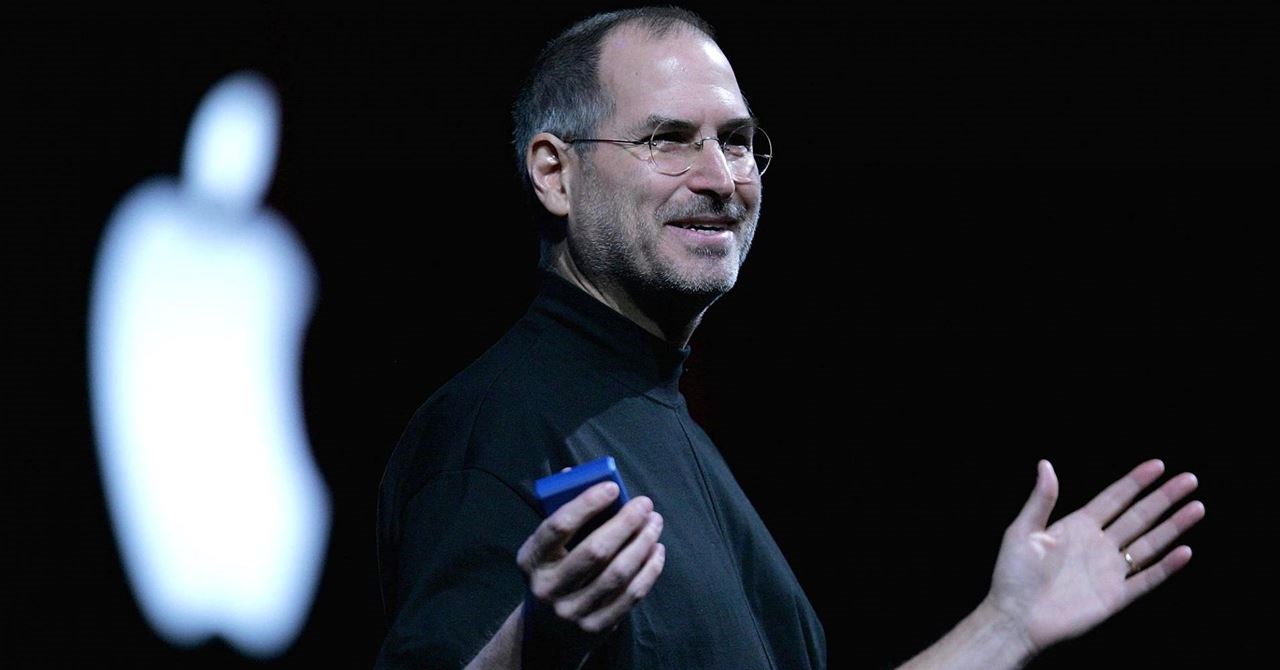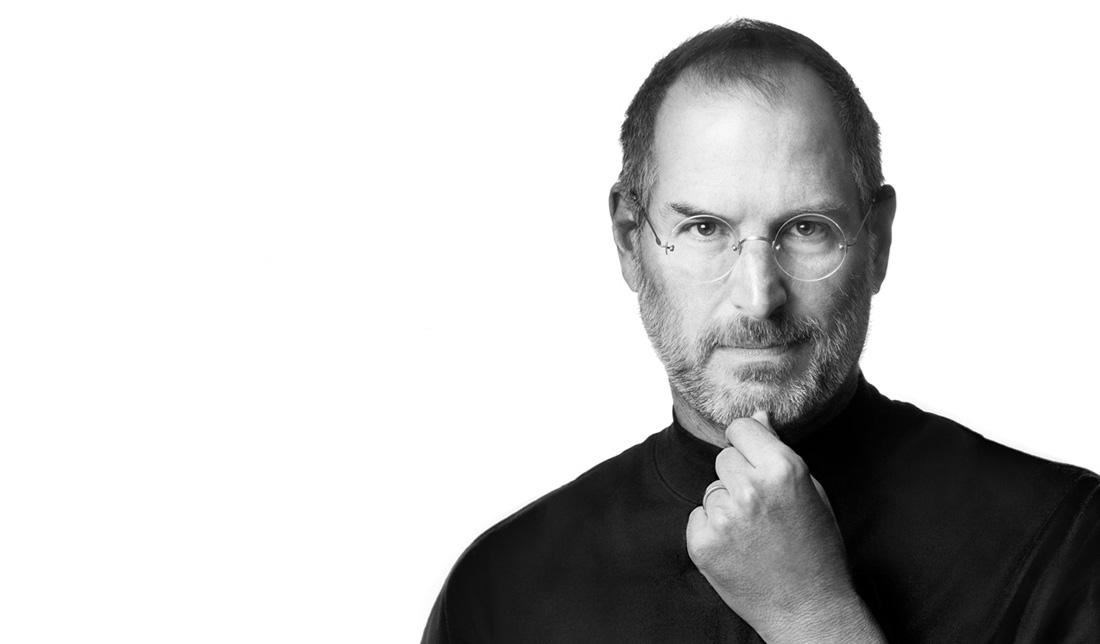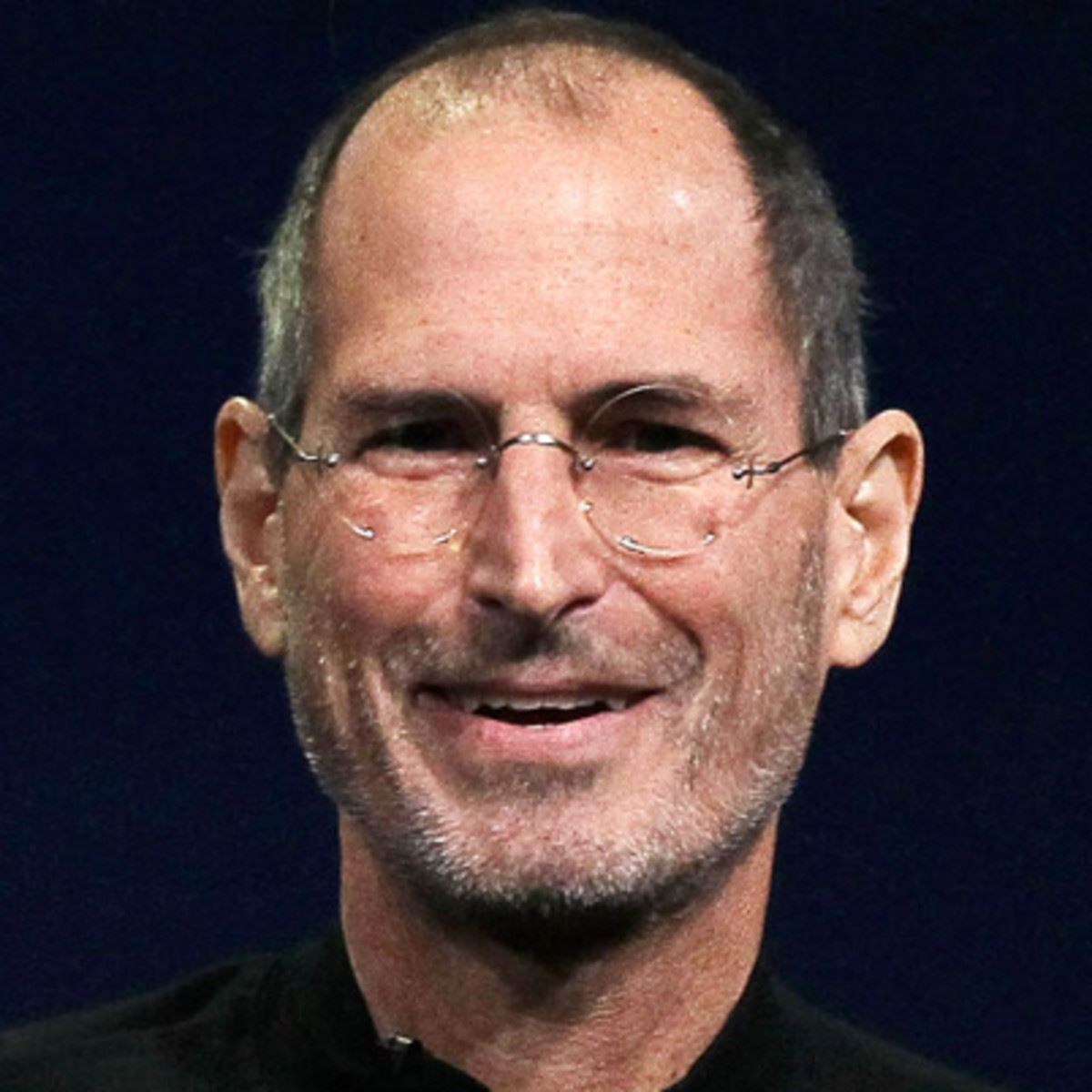Joseph Campbell once said, “A hero is someone who has given his or her life to something bigger than oneself.” Along with sacrificing oneself for the greater good, as Campbell said, heroism consists of a plethora of traits, such as perseverance, tenacity, and bravery. Heroism manifests today in people’s character and moral values. People may be heroic in their own ways, whether it is something as trivial as picking up a plastic bottle on the street or contributing to a global cause. Heroes have unique traits, but two that set them apart is confidence in their work and immense focus on their goals. To be confident means to have a feeling of self-assurance and to have faith in oneself. Focus involves paying attention to one’s goals and making sure that those goals are the center of one’s interest.
 Steve Jobs at an Apple Keynote...from CNBC.comSteve Jobs exceeds the requirements of the criteria, without a doubt. Jobs, a computer scientist and entrepreneur, was born in San Francisco on February 24, 1955. Jobs attended Reed College, however he dropped out of the class during the first semester. Over the course of his life, he worked at many well-renowned companies such as NeXT, Apple, and Pixar. His work paved the path for many PC companies who now look at Jobs’ design of the Macintosh as an example of a superb user-interface. Confidence and focus undoubtedly played key roles in Jobs’ success. Through confidence in his work, and focus on his goals, Steve Jobs epitomizes the traits of an inspiring hero.
Steve Jobs at an Apple Keynote...from CNBC.comSteve Jobs exceeds the requirements of the criteria, without a doubt. Jobs, a computer scientist and entrepreneur, was born in San Francisco on February 24, 1955. Jobs attended Reed College, however he dropped out of the class during the first semester. Over the course of his life, he worked at many well-renowned companies such as NeXT, Apple, and Pixar. His work paved the path for many PC companies who now look at Jobs’ design of the Macintosh as an example of a superb user-interface. Confidence and focus undoubtedly played key roles in Jobs’ success. Through confidence in his work, and focus on his goals, Steve Jobs epitomizes the traits of an inspiring hero.
 Steve Jobsfrom boomsbeat.comJobs’ confidence is one of the key factors that helped him succeed in his career. His confidence is evident in an excerpt from Funk & Wagnalls New World Encyclopedia that talks all about his achievements and accomplishments: “In 1976, at the age of 21, he founded Apple Computer, Inc., with Stephen G. Wozniak, a friend and fellow computer hobbyist, with an investment of just $1300... Five years after its founding, Apple had grown into a $500 million public corporation. In 1984 the company introduced the Macintosh computer. With its innovative windows environment, graphical user interface, and mouse pointer, the Macintosh set the standard for ease of use, or user-friendliness, in PCs” (“Funk & Wagnalls New World Encyclopedia”). With an investment of $1300, a high amount in the 1900’s, Jobs must have been very confident about his start-up company. Making a decision like this was extremely risky, in business terms, but Jobs still wanted to go through with it. This confident attitude helped him make the Macintosh, eventually looked upon as a role model by other PC companies. This excerpt shows Jobs’ confidence due to the fact that he made such a big investment in a startup company. It conveys that he strongly believed not only in himself to make this decision, but in the future of the company. Additionally, in an interview, Jobs stated: “In doing the Macintosh, for example, there was a core group of less than a hundred people, and yet Apple shipped over ten million of them. Of course everybody's copied it and it's hundreds of millions now. That's pretty large amplification, a million to one” (Jobs). Jobs emphasizes the fact that his team is very driven. He is confident that his team would be able to ship all of the products. Jobs was able to become a successful entrepreneur due to his confident approach to his work. This trait helped him throughout his entire career.
Steve Jobsfrom boomsbeat.comJobs’ confidence is one of the key factors that helped him succeed in his career. His confidence is evident in an excerpt from Funk & Wagnalls New World Encyclopedia that talks all about his achievements and accomplishments: “In 1976, at the age of 21, he founded Apple Computer, Inc., with Stephen G. Wozniak, a friend and fellow computer hobbyist, with an investment of just $1300... Five years after its founding, Apple had grown into a $500 million public corporation. In 1984 the company introduced the Macintosh computer. With its innovative windows environment, graphical user interface, and mouse pointer, the Macintosh set the standard for ease of use, or user-friendliness, in PCs” (“Funk & Wagnalls New World Encyclopedia”). With an investment of $1300, a high amount in the 1900’s, Jobs must have been very confident about his start-up company. Making a decision like this was extremely risky, in business terms, but Jobs still wanted to go through with it. This confident attitude helped him make the Macintosh, eventually looked upon as a role model by other PC companies. This excerpt shows Jobs’ confidence due to the fact that he made such a big investment in a startup company. It conveys that he strongly believed not only in himself to make this decision, but in the future of the company. Additionally, in an interview, Jobs stated: “In doing the Macintosh, for example, there was a core group of less than a hundred people, and yet Apple shipped over ten million of them. Of course everybody's copied it and it's hundreds of millions now. That's pretty large amplification, a million to one” (Jobs). Jobs emphasizes the fact that his team is very driven. He is confident that his team would be able to ship all of the products. Jobs was able to become a successful entrepreneur due to his confident approach to his work. This trait helped him throughout his entire career.
Among the many heroic traits that Jobs embodies, his innate ability to focus on his goals is one of his most significant qualities. Jobs’ natural focus shows in Funk & Wagnalls New World Encyclopedia: “During the next two years, he helped engineer a spectacular turnaround at Apple, restoring the company’s profitability as well as its reputation for innovative design; the term ‘interim’ was dropped from his title in January 2000. Apple’s resurgence continued into the early 2000s, propelled by the success of the iPod portable music player and iTunes online music store… Jobs also oversaw the development of the iPhone cellular telephone and the iPad tablet computer, both of which use a touchscreen interface” (“Funk & Wagnalls New World Encyclopedia”). Jobs accomplished his goal of integrating a touch screen into a cellular device, with focus. In an interview, his focused mindset is clearly displayed: “I always considered part of my job was to keep the quality level of people in the organizations I work with very high. That's what I consider one of the few things I actually can contribute individually -- to really try to instill in the organization the goal of only having 'A' players” (Jobs). Jobs wants his company to hire the most qualified and focused people in order to produce high-quality products, which shows his focus on his work. He is so single-mindedly dedicated to his goals that he wants all the people around him to model the same trait. Jobs’ natural ability to focus on his goals gives him the power he needs to be successful in his career.
 Steve Jobsfrom Bio.comSteve Jobs is an inspiration not only because of his confident attitude toward his work, but also because of his ability to focus on his goals. His heroism is exhibited in many aspects of his life, such as the creation of Apple and NeXT. Steve Jobs is a role model not only to me, but to many others. He exemplifies the traits that make him worthy of the title “hero.” I personally believe that confidence and focus are the most important traits that help an individual succeed and achieve their goals. Confidence is needed to overcome your fears and have firm self-belief. Focus makes one more alert in the real world, and it helps one make decisions that may seem difficult at first. Steve Jobs is a model of the perfect hero, therefore he motivates me to do my best and attempt be confident and focused in every way. Steve Jobs was truly “...someone who has given his or her life to something bigger than oneself,” through his innovative products and his revolutionary worldview.
Steve Jobsfrom Bio.comSteve Jobs is an inspiration not only because of his confident attitude toward his work, but also because of his ability to focus on his goals. His heroism is exhibited in many aspects of his life, such as the creation of Apple and NeXT. Steve Jobs is a role model not only to me, but to many others. He exemplifies the traits that make him worthy of the title “hero.” I personally believe that confidence and focus are the most important traits that help an individual succeed and achieve their goals. Confidence is needed to overcome your fears and have firm self-belief. Focus makes one more alert in the real world, and it helps one make decisions that may seem difficult at first. Steve Jobs is a model of the perfect hero, therefore he motivates me to do my best and attempt be confident and focused in every way. Steve Jobs was truly “...someone who has given his or her life to something bigger than oneself,” through his innovative products and his revolutionary worldview.
Works Cited
Computerworld. “Steve Jobs interview: One-on-One in 1995.” COMPUTERWORLD, 6 Oct. 2011,www.computerworld.com/article/2498543/it-management/steve-jobs-interview--one-on-one-in-1995.html?page=2.
"Jobs, Steve." Funk & Wagnalls New World Encyclopedia, 2017, p. 1p. 1. EBSCOhost, search.ebscohost.com/login.aspx?direct=true&db=funk&AN=JO023050&site=ehost-live.
"Joseph Campbell Quotes." BrainyQuote.com. Xplore Inc, 2018. 25 February 2018. https://www.brainyquote.com/quotes/joseph_campbell_138795
“The Leadership Qualities of Steve Jobs.” Center for Work Life, 9 Oct. 2013, www.centerforworklife.com/the-leadership-qualities-of-steve-jobs/.
Page created on 2/26/2018 7:31:15 AM
Last edited 2/26/2018 7:49:36 AM
